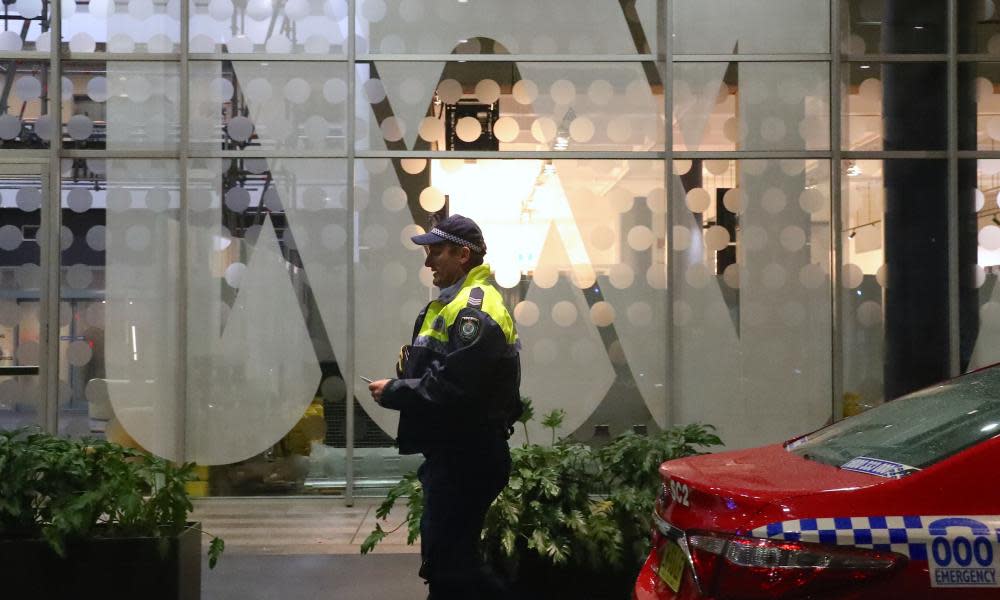Concrete action rather than nice words are needed on press freedom

One day Australians might come to thank the Australian federal police for their raids on the ABC and the home of a News Corp journalist last June, public integrity Professor AJ Brown suggested during a Senate inquiry last week.
The raids – combing through the ABC’s computer system and journalist Annika Smethurst’s kitchen cupboards and underwear drawers – were condemned around the world as outrageous and heavy-handed. But Brown was observing that they have also finally focused national attention on the rising tide of laws inhibiting press freedom and public interest whistleblowing.
For now, Brown’s optimism is premature.
The journalists do not know whether they will be prosecuted and their employers are still challenging the warrants in the high court.
Related: Christian Porter says he can't guarantee he wouldn't prosecute journalists
Any concessions the government has made in response to the public shock and outrage have been nice words rather than concrete action.
In August the home affairs minister, Peter Dutton, issued a ministerial direction saying he expected “the AFP to take into account the importance of a free and open press in Australia’s democratic society and to consider broader public interest implications before undertaking investigative action involving a professional journalist or news media organisation in relation to unauthorised disclosure of material made or obtained by a current or former Commonwealth officer”.
And the attorney general, Christian Porter, has said he would be “seriously disinclined” to authorise the prosecution of journalists and that the director of public prosecutions would need his personal approval before proceeding with any charges.
Fine sentiments, but you don’t need to be an investigative reporter to see they fall well short of any kind of statutory guarantee, and as the Law Council president, Arthur Moses, told the National Press Club, the result would be “an apprehension on the part of journalists that they will need to curry favour with the government or, in particular, the attorney general in order to avoid prosecution”.
After a revised private sector whistleblower act passed late last year, the attorney general has also promised to review public sector whistleblowing laws, which cramp the public’s ability to find out about wrongdoing and maladministration at least as much as laws directly pertaining to journalism.
But the ATO whistleblower Richard Boyle is still facing 66 charges, equivalent to six life sentences, the defence lawyer David McBride is also facing charges, and Witness K and his lawyer, Bernard Collaery, are facing jail time for helping correct what they saw as a gross injustice when the Australian Secret Intelligence Service (Asis) bugged offices of the government of impoverished Timor-Leste during billion-dollar resource negotiations between the two nations.
So it seems safe to conclude that any change in the government’s mood about public sector whistleblowing is also a promise in urgent need of substantiation.
Now Australia’s major media organisations are joining forces to demand a minimum set of changes, fighting back against over 60 pieces of legislation introduced over the past two decades that effectively criminalise journalism and penalise whistleblowing.
We have six core demands:
The right to challenge the government’s application for warrants against journalists and media organisations, before they are issued.
Exemptions for journalists from laws that would put them in jail for doing their jobs, including the security laws enacted over the last seven years.
Adequate legislated protections for public sector whistleblowers.
A new regime to limit which documents can be stamped secret.
Reform of the freedom of information (FOI) regime.
Reform to laws that make Australia the defamation capital of the world.
Valid, more far-reaching changes are also being advocated before the two parliamentary committees now investigating press freedom, the Parliamentary Joint Committee on Intelligence and Security (the same committee that approved most of the heavy-handed national security laws in the first place) and the Senate inquiry into press freedom, which began hearings last week.
Related: AFP won't rule out charging News Corp journalist Annika Smethurst after raid
The former Al Jazeera journalist Peter Greste, who now heads the Alliance for Journalists’ Freedom, is pushing for a Media Freedom Act, to enshrine press freedom in legislation and more clearly define its democratic role.
Guardian Australia has joined the joint media campaign and supports the demands as a minimum. We’ve been longstanding critics of the security law overreach.
But if media organisations really want to convince readers and viewers that we perform an essential service we also need to be self-reflective, including about whether we’ve always applied suitable scepticism to government claims about national security.
And it’s difficult to champion the democratic role of the fourth estate while also making common cause with Donald Trump’s concerted campaign to delegitimise and ridicule our profession, as Sky News’s Paul Murray seemed to do during the only Australian media interview with the president on Scott Morrison’s recent US visit. Murray joked along with Trump about the “wonderful smile” on Morrison’s face when the president had, during an earlier press conference, “taken apart the fake news media”.
Actually the questions that so bothered the president that day were about the whistleblower who raised allegations regarding Trump’s dealings with Ukraine – the allegations now the subject of an impeachment inquiry.
That’s real news. And if it happened in Australia the public is unlikely to ever know about it because whistleblower laws do not apply to politicians, and intelligence information is exempted.

 Yahoo News
Yahoo News 
